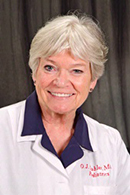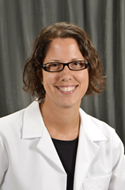Pediatric Research Newsletter
August 2015
Research Program Highlight:
Thomas Mariaini, Ph.D.

Thomas J. Mariani, Ph.D., Associate Professor of Neonatology in the Department of Pediatrics at University of Rochester Medical Center, is trained as a molecular biologist but is also involved with a variety of activities not typically associated with molecular biology. “I enjoy developing cohorts and using genomic techniques,” said Dr. Mariani. “I tend to be on collaborative teams.”
In particular, Dr. Mariani is heading the Program in Pediatric Molecular & Personalized Medicine, which includes an umbrella of projects with a common focus on translational research in pediatric lung disease. This team of researchers is applying genomic methods to biospecimens collected from cohorts of premature and term infants to detect genes that might help to predict which infants are at high risk for the development of lung diseases. “We have transcriptional datasets from patient cohorts and animal models of [these] diseases that are used for discovery,” explained Dr. Mariani. “We use cellular and molecular approaches to understand if these genes are related to mechanisms of disease.”
The genes identified by these correlative approaches are first analyzed to eliminate false positives. The remaining genes can have one of two relationships to the disease process. First, the gene, or a structural or functional variant of the gene, may correlate with the presence of disease. For example, a specific mutation or single nucleotide polymorphism (SNP) may be a marker for the disease or, alternatively, the pattern of expression of the gene may correlate with the disease. Second, the gene may be mechanistically or causally related to the disease. In some instances, a gene may be both a marker for the disease and casually related to its pathogenesis. Genes that correlate with the presence of disease can be useful biomarkers and form the basis of point-of-care diagnostics, while genes that directly contribute to pathogenesis represent potential targets for the development of therapeutic interventions.
Although Dr. Mariani collaborates on projects related to many different types of pediatric lung disease, the two major areas of focus are chronic lung diseases associated with preterm births and acute lung disease associated with lung infections. “The goal is to think about the process behind the disease to uncover predictive or causal genes,” said Dr. Mariani. “We conduct research to address both.”
Two of Dr. Mariani’s main collaborators are Mary T. Caserta, M.D., in the Division of Pediatric Infectious Diseases, and Gloria S. Pryhuber, M.D., in the Division of Pediatric Neonatology. These collaborations bring different areas of expertise to make for a better overall product. “My two ‘callings’ are an interest in the disease per se and an interest in the mechanistic aspects of disease,” said Dr. Mariani. “What I do now is a product of these interests. My passion lies in the translational aspects of research.”
Caregivers of Children with Cancer See Benefits from Bright IDEAS: Problem-Solving Skills Training
 Olle Jane ("OJ") Sahler, M.D., Professor of Pediatrics, Psychiatry, Medical Humanities, and Oncology, is working to bring problem-solving skills training (PSST) to about 200 pediatric psycho-oncology providers throughout the US and Canada with the help of a newly awarded $1.4 million R25 education grant from the National Cancer Institute. The providers will work with parents or other caregivers of children with cancer. The caregivers will be taught strategies to solve problems and manage adverse situations to decrease perceived distress and increase coping skills and well-being.
Olle Jane ("OJ") Sahler, M.D., Professor of Pediatrics, Psychiatry, Medical Humanities, and Oncology, is working to bring problem-solving skills training (PSST) to about 200 pediatric psycho-oncology providers throughout the US and Canada with the help of a newly awarded $1.4 million R25 education grant from the National Cancer Institute. The providers will work with parents or other caregivers of children with cancer. The caregivers will be taught strategies to solve problems and manage adverse situations to decrease perceived distress and increase coping skills and well-being.
Dr. Sahler’s version of PSST intervention is referred to as Bright IDEAS. Bright for the sense of optimism that is essential to overcoming adverse life events and the five steps of problem solving:
- Identify the problem,
- Define your options,
- Evaluate your options,
- Act, and
- See if it worked.
The intervention was developed specifically to help caregivers face the demands and stresses of medical care for children with cancer while still managing the family’s ongoing daily needs. The Bright IDEAS project was first funded in 1995 and has been tested in almost 1000 mothers and other caregivers of recently diagnosed childhood cancer patients. The training has been found to be highly effective in improving mood, anxiety, and post-traumatic stress as long as three months after the intervention has been completed. Dr. Sahler also has preliminary data that the intervention can be applied to problems encountered across many illness types, most recently in a study of mothers of children with autism spectrum disorder. Bright IDEAS was designated as a research-tested intervention program (RTIP) by the NCI in 2010 and is included in electronic print format on the RTIP website for worldwide distribution.
Dr. Sahler and her collaborators at the University of Colorado Denver, Children’s Hospital Los Angeles, St. Jude Children’s Research Hospital, Children’s Hospital of Pittsburgh, and the UT/MD Anderson Cancer Center are currently developing an online version of Bright IDEAS that would be available 24/7 via any computer, tablet, or phone with Internet access.
To increase the reach of Bright IDEAS and make its benefits more widely known, the newly awarded R25 grant will allow Dr. Sahler and her colleagues to train 200 psycho-oncology care providers, such as advanced practice nurses, social workers, and psychologists working with families at child cancer centers in North America. Ten training workshops will be held over four years in conjunction with meetings of the Children’s Oncology Group (COG), the Association of Pediatric Hematology/Oncology Nurses (APHON), the Association of Pediatric Oncology Social Workers (APOSW), and the Society of Pediatric Psychology (SPP). Twenty of the 200 pediatric psycho-oncology providers will be selected to become Bright IDEAS “train-the-trainers” to help reach an even broader audience. Dr. Sahler’s co-PI on this project is Robert Noll, Ph.D. at the Children’s Hospital of Pittsburgh.
Fellowship Fosters Basic Science and Translational Interests in Pediatric Infectious Diseases: Pneumocystis, RSV and Influenza

Brenda L. Tesini, M.D., Clinical Instructor and graduate of the Pediatric Infectious Diseases (ID) Fellowship Program was recently chosen for the inaugural Caroline Breese Hall, M.D. Award. This award was established through an endowment created in honor of Dr. Hall, who was internationally-renowned University of Rochester clinician, researcher and scholar. The research award provides funding to a promising fellow or junior faculty member working in an area of infectious diseases; Dr. Hall was a pioneer in pediatric infectious diseases through her leadership in the Pediatric Infectious Diseases Society, the AAP Committee on Infectious Diseases (Red Book Committee) and her groundbreaking research in pediatric virology.
Throughout her pediatric fellowship, Dr. Tesini was immersed in basic science research. Her fellowship research with mentor Francis Gigliotti, M.D., focused on the development of a pneumocystis pneumonia vaccine using a mouse model and has been submitted for publication. Having a longstanding interest in pulmonary infections, Dr. Tesini has expanded the scope of her research to include respiratory syncytial virus (RSV) and influenza. After graduating from fellowship in June 2015, Dr. Tesini, who is trained in both internal medicine and pediatrics, began a 9-month clinical instructor appointment in Pediatric Infectious Diseases which will be immediately followed by a clinical fellowship in Adult Infectious Diseases.
Dr. Tesini’s work on respiratory viral infections follows in the footsteps of Dr. Hall, who published several landmark studies of RSV infection in children. Continuing a practice used by Dr. Hall, Dr. Tesini participated in home visits throughout Western New York to collect samples from infants with RSV this past winter. In collaboration with Mary T. Caserta, M.D.; Edward Walsh, M.D.; and an interdisciplinary group of investigators in the Departments of Pediatrics, Microbiology & Immunology and the Respiratory Pathogens Research Center (RPRC), Dr. Tesini is working to further understand the differences in RSV severity in order to improve prevention, outcomes and treatment. She feels fortunate to carry on the work of Dr. Hall. In addition, Dr. Tesini is studying the B cell response in subjects who contract seasonal influenza after receiving the vaccination. Working with David J. Topham, Ph.D., Mark Sangster, Ph.D. and the New York Influenza Center of Excellence (NYICE), the team is studying the immunoresponse of patients from the onset of infection and afterwards. In doing so, they will gain a better understanding of the antibodies that result from infection and, of these, which are needed and preserved for future protection. Why doesn't the flu vaccine protect everyone? In the quest to answer this global question, researchers hope to gain further understanding by looking at individual cellular responses.
Dr. Tesini looks forward to continued work on these translational projects. One of the most impressive features of Dr. Hall’s career was her ability to bridge between clinical and basic science research at a time when it wasn’t all that common. “It’s a special way to work here in her memory,” Dr. Tesini said. “She was an incredible inspiration, especially to women in science.”
Learn more
The Caroline Breese Hall Endowment will continue to support fellows or junior faculty members in Infectious Diseases. Learn more about how you can support the endowment’s initiative and about the collaboration and basic science, health science and translational research of the Department of Pediatrics.
Highlighted Research Publications
March – August 2015
- Effectiveness and Safety of Acute Care Telemedicine for Children with Regular and Special Healthcare Needs. McConnochie KM, Ronis SD, Wood NE, Ng PK. Telemed J E Health. 2015 Apr 3. [Epub ahead of print]. PMID: 25839784
- Preterm cord blood CD4+ T cells exhibit increased IL-6 production in chorioamnionitis and decreased CD4+ T cells in bronchopulmonary dysplasia. Misra RS, Shah S, Fowell DJ, Wang H, Scheible K, Misra SK, Huyck H, Wyman CP, Ryan RM, Reynolds AM, Mariani TJ, Katzman PJ, Pryhuber GS. Hum Immunol. 2015 Mar 20. pii: S0198-8859(15)00099-3. doi: 10.1016/j.humimm.2015.03.007. [Epub ahead of print] PMID: 25797206
- Predicting Outcome of Community-Based Early Intensive Behavioral Intervention for Children with Autism. Smith T, Klorman R, Mruzek DW. J Abnorm Child Psychol. 2015 Mar 17. [Epub ahead of print] PMID: 25778537
- The histone methyltransferase Setd8 represses Gata2 expression and regulates erythroid maturation. Malik J, Getman M, Steiner LA. Mol Cell Biol. 2015 Apr 6. pii: MCB.01413-14. [Epub ahead of print] PMID: 25848090
- Effect of parent training vs parent education on behavioral problems in children with autism spectrum disorder: a randomized clinical trial. Bearss K, Johnson C, Smith T, Lecavalier L, Swiezy N, Aman M, McAdam DB, Butter E, Stillitano C, Minshawi N, Sukhodolsky DG, Mruzek DW, Turner K, Neal T, Hallett V, Mulick JA, Green B, Handen B, Deng Y, Dziura J, Scahill L. JAMA. 2015 Apr 21;313(15):1524-33. doi: 10.1001/jama.2015.3150. PMID: 25898050
- Discordance between resident and faculty perceptions of resident autonomy: can self-determination theory help interpret differences and guide strategies for bridging the divide? Biondi EA, Varade WS, Garfunkel LC, Lynn JF, Craig MS, Cellini MM, Shone LP, Harris JP, Baldwin CD. Acad Med. 2015 Apr;90(4):462-71. doi: 10.1097/ACM.0000000000000522. PMID: 25340363
- Bmi-1 Regulates Extensive Erythroid Self-Renewal. Kim AR, Olsen JL, England SJ, Huang YS, Fegan KH, Delgadillo LF, McGrath KE, Kingsley PD, Waugh RE, Palis J. Stem Cell Reports. 2015 May 27. pii: S2213-6711(15)00132-0. doi: 10.1016/j.stemcr.2015.05.003. [Epub ahead of print] PMID: 26028528
- Secondhand Smoke Exposure Reduction After NICU Discharge: Results of a Randomized Trial. Blaakman SW, Borrelli B, Wiesenthal EN, Fagnano M, Tremblay PJ, Stevens TP, Halterman JS. Acad Pediatr. 2015 Jul 22. pii: S1876-2859(15)00169-2. doi: 10.1016/j.acap.2015.05.001. [Epub ahead of print] PMID: 26210908
- Hyperuricemia and Progression of CKD in Children and Adolescents: The Chronic Kidney Disease in Children (CKiD) Cohort Study. Rodenbach KE, Schneider MF, Furth SL, Moxey-Mims MM, Mitsnefes MM, Weaver DJ, Warady BA, Schwartz GJ. Am J Kidney Dis. 2015 Jul 21. pii: S0272-6386(15)00922-1. doi: 10.1053/j.ajkd.2015.06.015. [Epub ahead of print] PMID: 26209544